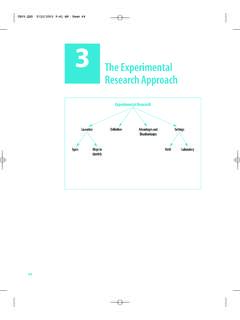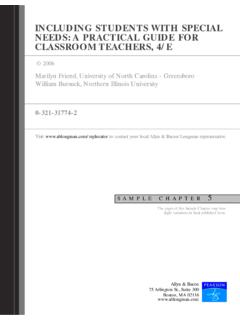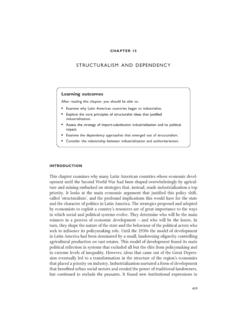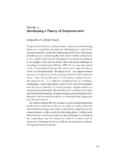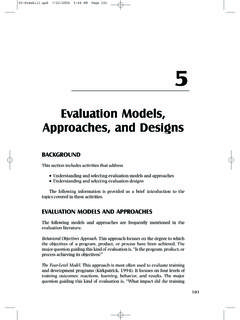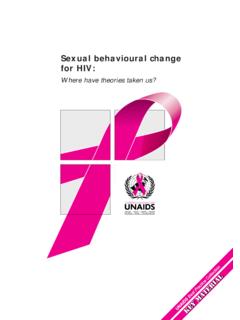Transcription of THEORIES OF COUNSELING AND …
1 ALLYN & OF COUNSELING AND PSYCHOTHERAPY: A Multicultural Perspective, 6/e 2007 Allen E. IveyMichael D'AndreaMary Bradford IveyLynn Simek-MorganISBN 0-205-48225-2 SAMPLE chapter 11: The Fourth Force in COUNSELING and Therapy:Multicultural and Feminist PerspectivesThe pages of this Sample chapter may have slight variations in final published chapter contact your local Allyn & Bacon/Longman Fourth Force in COUNSELING and Therapy:Multicultural andFeminist PerspectivesHistorically, we talk of first-forcepsychodynamic, second-forcecognitive-behavioral, and third-forceexistential-humanistic COUNSELING andtherapy THEORIES . COUNSELING andpsychotherapy really began with Freud andpsychoanalysis. James Watson and, later,B. F. Skinner challenged Freud s emphasison the unconscious and focused onobservable behavior. Carl Rogers, with hisperson-centered COUNSELING , revolutionizedthe helping professions by focusing on theimportance of nurturing a caring therapist-client relationship in the helping process.
2 Allthree approaches are still alive and well inthe fields of COUNSELING and psychology, asdiscussed in Chapters 5 through 10. As youreflect on the new knowledge and skills youexercised by reading the preceding chaptersand completing the competency-buildingactivities in those chapters, hopefully youpart three319will see that you have gained a more sophis-ticated foundational understanding of thethree traditional theoretical forces that haveshaped the fields of COUNSELING and therapyover the past one hundred in this book have been intended tobring your attention to both the strengthsand limitations of psychodynamic, cognitive-behavioral, and existential-humanisticperspectives. With these perspectives inmind, the following chapters examine thefourth major theoretical force that hasemerged in the mental health professionsover the past 40 years: the multicultural-feminist-social justice COUNSELING world-view. The perspectives of the fourth forcechallenge you to learn new competenciesyou will need to acquire to work effectively,respectfully, and ethically in a culturallydiverse 21st-century Three begins by discussing the riseof the feminist COUNSELING and therapyperspective ( chapter 11) and multiculturalcounseling and therapy (MCT) THEORIES ( chapter 12).
3 To assist you in synthesizingmuch of the information contained in all ofthe preceding chapters, chapter 13 presentsa comprehensive and integrative helpingtheory referred to as developmental coun-seling and therapy (DCT). chapter 14 offers a comprehensive examination of familycounseling and therapy THEORIES to furtherextend your knowledge of ways that mentalhealth practitioners can assist 9/12/2006 3:16 PM Page 319families in realizing new and untappeddimensions of their collective chapter 15 provides guidelines tohelp you develop your own approach tocounseling and therapy that complements agrowing awareness of your own values,biases, preferences, and relational compe-tencies as a mental health , competency-building activitiesoffer you opportunities to continue to exer-cise new skills associated with the differenttheories discussed in Part 9/12/2006 3:16 PM Page 320 Feminist COUNSELING and TherapyJudy DanielsUniversity of Hawai i, Manoachapter goalsThis chapter is designed to:1.
4 Increase your knowledge of the evolution of the feminist movement, in general, and thefeminist COUNSELING and therapy movement in the United States, in Introduce you to three myths that many counselors and therapists operate from whenworking with Stimulate new insights regarding the need to deal with the complex problem of sexism inour society when working with women and Help you to become knowledgeable of feminist identity development theory and itsimplications for COUNSELING and Facilitate a more expansive understanding of the similarities and differences in feministcounseling and therapy (FCT) THEORIES and multicultural COUNSELING helping Introduce you to relational-cultural therapy (RCT).7. Provide competency-building activities that can assist you in exercising new skills to usewhen implementing FCT theory into your professional are a number of important commonalities that characterize the three majortheoretical forces that continue to have a significant impact on the work counselorsand therapists The fact that the majority of persons who developed the psychodynamic, cognitive-behavioral, and existential-humanistic THEORIES discussed in Part Two of this book are These men also worked from a middle- and upper-middle-class The vast majority of them come from White European-American 9/12/2006 3:16 PM Page 321 PART 3.
5 THE FOURTH FORCE IN COUNSELING AND of these factors (a person s gender, socioeconomic background, and cultural/racial group affiliation) are known to significantly affect one s psychological develop-ment and relational empowerment. In addition, feminist theorists and researchers pointto the impact of a person s gender in shaping one s psychological perspective and mean-ing of the world. Feminist theorists and researchers direct particular attention to thenegative economic, social, psychological, and spiritual consequences that commonlyensue from being socialized within a societal context that perpetuates various forms ofinstitutionalized sexism and forms of institutionalized sexism and patriarchy are manifested and main-tained in hierarchical power arrangements in which men are consistently placedat higher, more privileged positions in our society. Specific manifestations of thesehierarchical power arrangements include, for example, the fact that men typicallyhave higher-paying career positions and the continuing disparity in pay women withthe same qualifications receive for doing the same work as men (Evans, Kinade,Marbley, & Seem, 2005).
6 An example of how patriarchy is manifested in COUNSELING and therapy is whenpractitioners are viewed (and commonly view themselves) as experts who have theright and responsibility to impose specific helping THEORIES and perspectives of mental health on persons experiencing psychological distress, regardless of the factthat cultural, racial, or gendered biases are reflected in these theoretical viewpoints(Cartwright, D Andrea, & Daniels, 2003). The perpetuation of these complex formsof social injustice not only result in the privileging of men by continuing the oppres-sion of women but also adversely affect the mental health and psychological well-being of millions of women and men through creating other forms of culturalstratification and oppression (hooks, 2000).Feminist COUNSELING and therapy (FCT) advocates have long noted that theimposition of gender-biased helping strategies that are embedded in the threemajor theoretical forces discussed earlier constitute unique forms of social injus-tice that continue to be perpetuated in the fields of COUNSELING and psychology(Brown & Root, 1990).
7 The imposition of gender-biased THEORIES by persons inpositions of power ( , by counselors and therapists) on those with less power( , female clients seeking help during times of personal vulnerability) is one wayin which social injustice is played out in many traditional COUNSELING and continued emphasis by traditional helping THEORIES on having clients reenterthe environmental settings that contributed to their psychological distress alsocharacterizes the inherent social injustice of traditional COUNSELING and psychother-apy (Comstock, 2005; Ridley, 2005). Feminist and multicultural COUNSELING theoristsconsistently question the ethics of such practice (hooks, 2000; Parham, 2002).This chapter aims to increase your understanding of the ways in which FCTadvocates have worked to overcome these forms of sexism and patriarchy in thehelping professions. It is also designed to assist you in developing some of the skillsnecessary to implement feminist COUNSELING and therapy strategies in your futureprofessional 9/12/2006 3:16 PM Page 32211.
8 FEMINIST COUNSELING AND THERAPY323 The Feminist COUNSELING and Therapy Movement: An OverviewWhile the feminist COUNSELING and therapy (FCT) movement emerged during the cul-tural revolution that took place in the United States in the 1960s and 1970s, muchearlier in our nation s history many women set the tone for the spirit and principlesthat underlie this movement. The calls for freedom and social justice by many con-temporary feminist COUNSELING and therapy theorists are in accord with efforts ofHarriet Tubman, who assisted hundreds of Black slaves to freedom through theUnderground Railroad during the early and mid 1880s. Many other female abolitionand women s suffrage advocates, such as Elizabeth Stanton, Sojourner Truth, andSusan B. Anthony, played pivotal roles in fostering an expanded consciousnessrelated to the rights to life, liberty, and the pursuit of happiness as they applied to allpeople, including women, duing the mid 1800s and early the social justice principles and spirit that underlie the FCT movementhave roots in a long history of the struggle for women s personal and politicalempowerment, mental health, and collective well-being, the genesis of this movementcan be found in the publications of feminist COUNSELING theorists of the 1960s and1970s.
9 At that time, increasing numbers of women actively took a stand against thevarious ways in which institutionalized forms of sexism and patriarchy underminedwomen s human dignity, mental health, and full citizenship rights. The early pioneersin the FCT movement directed much attention to three areas of relevance: uncovering the ways in which the gender biases that are embedded in the threetraditional theoretical forces are routinely played out in the work of mentalhealth practitioners describing how the use of gender-biased COUNSELING and therapy THEORIES andpractices are harmful to women (and men) developing an alternative helping paradigm that is better suited for women shealth, development, empowerment, and psychological liberationSpace limitations restrict a detailed description of the numerous pioneers whocreated the FCT paradigm that continues to significantly shape the way many men-tal health professionals operate in the field today.
10 What follows is a brief descriptionof some of the key persons and the contributions they made in building the FCT forcein the United States, a force that has helped formulate a new psychology of a New Psychology of WomenAs noted earlier, the traditional COUNSELING and therapy THEORIES that have beenimplemented in the field over the past one hundred years reflect the gender, economicclass, and cultural values, preferences, and biases of the men who developed pioneers focused on these values, preferences, and biases as they sought to buildnew helping frameworks that reflected greater respect for and understanding of theunique psychological development of 9/12/2006 3:16 PM Page 323 PART 3. THE FOURTH FORCE IN COUNSELING AND Baker MillerThe efforts of the early FCT pioneers took place during the fervor of the 1960s and1970s, when the United States was in the midst of major social, political, and culturalchange. The opening sentence in Jean Baker Miller s (1986) book entitled Toward aNew Psychology of Womencaptures the zeitgist of that time.
